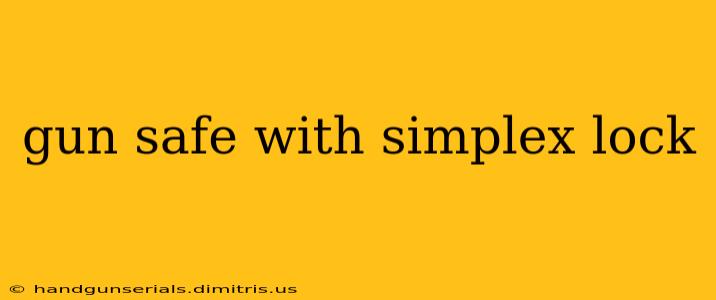Finding the right gun safe is crucial for responsible firearm ownership. Security features are paramount, and the type of locking mechanism plays a significant role. This guide delves into the specifics of gun safes equipped with simplex locks, exploring their advantages, disadvantages, and considerations for choosing the best one for your needs.
Understanding Simplex Locks in Gun Safes
A simplex lock, often referred to as a combination lock, is a type of mechanical lock that uses a dial or keypad to open. Unlike electronic locks, simplex locks don't require batteries or electricity, making them reliable even in power outages. They offer a balance between security and convenience, but understanding their nuances is key to making an informed decision.
How Simplex Locks Work
Simplex locks operate on a series of rotating discs or tumblers. The correct combination aligns these components, allowing the bolt to retract and the safe to open. The complexity of the lock mechanism directly influences its security level. Higher-quality simplex locks often feature more tumblers or intricate internal designs, increasing the difficulty for unauthorized access.
Advantages of a Simplex Lock Gun Safe
- Reliability: The absence of electronic components eliminates the risk of battery failure or malfunctions associated with electronic locks. This makes simplex locks incredibly reliable, especially in emergency situations.
- Cost-Effectiveness: Generally, gun safes with simplex locks are more affordable than those with electronic locks, offering a good balance between security and budget.
- Ease of Use: While the combination needs to be memorized, using a simplex lock is relatively straightforward compared to electronic locks, which might require learning a digital interface.
- No Power Dependency: This is perhaps the most significant advantage. In the event of a power outage, you can still access your firearm(s).
Disadvantages of a Simplex Lock Gun Safe
- Combination Security: The security of a simplex lock rests entirely on the secrecy of the combination. If the combination is compromised (either through guessing, observing, or forced entry), the safe becomes vulnerable.
- Potential for "Bumping": Though less common with high-quality locks, less sophisticated simplex locks can be susceptible to bumping techniques, where specially designed tools are used to manipulate the tumblers.
- Limited Features: Compared to electronic locks, simplex locks usually lack additional features such as time delays, audible alarms, or biometric access.
Choosing the Right Gun Safe with a Simplex Lock
Several factors should guide your decision when selecting a gun safe featuring a simplex lock:
Safe Size and Capacity:
Consider the number and size of firearms you intend to store, along with any additional items like ammunition or documents. Choose a safe with enough interior space to accommodate your needs without overcrowding.
Fire Resistance Rating:
Fire safety is crucial. Look for a safe with a fire resistance rating that meets your specific requirements, often expressed in hours of protection at a certain temperature.
Construction and Materials:
Solid construction is essential. Check for features like thick steel walls, a robust door, and effective reinforcement against pry attacks.
Lock Quality and Complexity:
The quality of the simplex lock mechanism is paramount. Look for safes with locks that have multiple tumblers, hardened steel components, and resistance to common attack methods like drilling and picking.
Maintaining Your Simplex Lock Gun Safe
Regular maintenance is crucial to ensure the longevity and security of your gun safe. This includes:
- Periodic Lubrication: Use a high-quality lock lubricant to keep the internal mechanisms operating smoothly.
- Combination Changes: Change your combination periodically to enhance security.
- Inspection for Damage: Regularly inspect the safe for signs of wear, damage, or tampering.
Choosing a gun safe with a simplex lock is a significant decision requiring careful consideration. By understanding the advantages and disadvantages, evaluating your specific needs, and prioritizing quality, you can select a secure and reliable safe to protect your firearms and valuables. Remember to consult with a security professional if you have specific concerns about your security needs.

